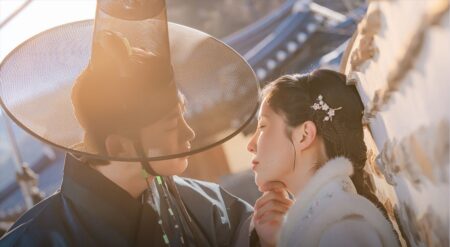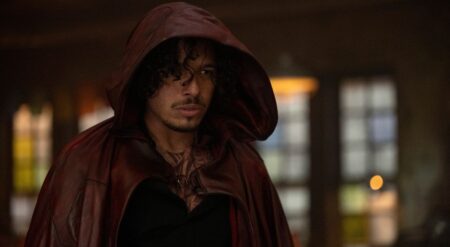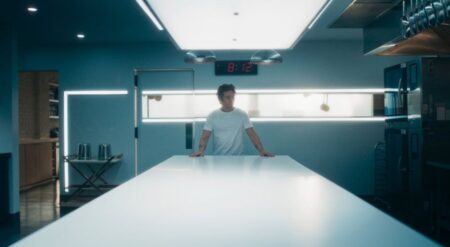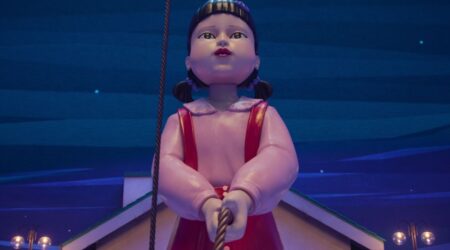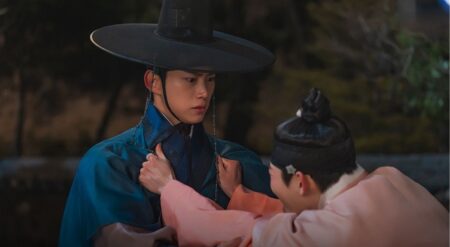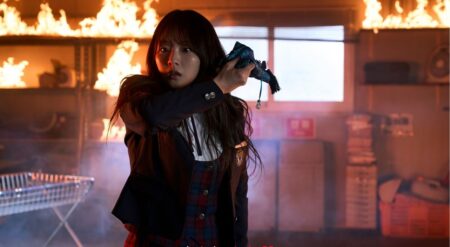In Hollywood (2020), creators Ryan Murphy and Ian Brennan set out to restore that gilded finish with a version of the Hollywood story that answers the question, “What if Hollywood had cared, the way that we do now?”
Old Hollywood is one of those images of pop culture that is burned deep into our brains. The glamour of it all, and the notion that the movies as we know them were born into a haze of dreamers and stars. It’s an incredibly seductive and lasting image.
One of the great struggles of being a film lover and a lover of Hollywood, the cultural concept, is the moment when the lights come up, the fantasy is over, and the sensibilities of 2020 society cast a shadow on all the glitz. The golden age of Hollywood looms like a set on a sound stage, glorious and lovely to the eye but ugly and shallow once the cameras are off. Façade would be the more on-the-nose term.
In Hollywood, a group of aspiring actors and filmmakers try to make it big in Tinsel Town at whatever cost. When a film unlike any other that came before arrives, these hopeful idealists get their shot. The series tackles issues of representation, misogyny, racial and queer discrimination, and the battle for voices to be heard. The series stars David Corenswet, Darren Criss, Laura Harrier, and Jeremy Pope, with a knockout ensemble featuring Samara Weaving, Holland Taylor, Jim Parsons, the Patti LuPone, Dylan McDermott, and many more.
At first blush, Hollywood is a thrill. The series perfectly and gorgeously illustrates the era and Murphy delivers the ultimate Hollywood fantasy. On a production design level, Hollywood (2020) is an absolute stunner. Better yet, Hollywood is more than just a pretty face. The ensemble boasts a range from fresh young faces to icons of stage and film, and every single one of them glitters. The ensemble performance is absolutely fantastic and these characters are so easy to love (or hate, depending on who you’re talking about). In this way, Hollywood perfectly captures the spirit of its subject matter – a sparkling dreamland for youthful beauty and icons alike, dripping with talent.
Regrettably, much like a beloved classic film with a shocking problematic element, that blush wears off once you look beyond the obvious charms of the series. Structurally, Hollywood has a real problem with pacing. The series has seven episodes to tell its story but takes its sweet time in gathering our ensemble together and venturing into the meat of the narrative. We don’t really see a switch from introductions to action until the last three episodes or so. The result is a dragging storyline, the neutering of what should be high stakes, and, the sin above all other sins, it creates a real problem in the development of these great characters.
Characters flip-flop from hero to villain and the redemptions feel rushed, at best, and totally devoid of crucial context at worst. There are so many great moments and build-ups that fizzle simply because the series tried to do too much with too little time. If I could scream into the past and know someone would hear me, I’d recommend ten episodes instead.

Admittedly, I’m not the biggest fan of revisionist histories. The tricky thing about history is that it can’t be undone. This isn’t a death knell for Hollywood, as I have a baseline appreciation for what it has set out to do. However, the series has an inconsistent approach to how it treats its “real-life” characters and the unfortunate result is that it undermines the entire production. There are three examples worth mentioning: the portrayals of Vivien Leigh, Rock Hudson, and Henry Willson.
The thing about Hollywood, the institution, is that it’s obsessed with itself. Remember when La La Land and The Artist were up for Academy Awards? Hollywood is no exception to the preening, self-congratulatory tradition of Tinsel Town representations being obsessed with their own reflection. The series purports to be a tearing down of the old gods… yet it still worships at the altar.
Hell, the fictional film at the center of Hollywood is about one of the most morbidly romantic Hollywood stories, the suicide of Peg Entwistle. The preoccupation with portraying Hollywood as a beautiful monster devouring starry-eyed dreamers. The unfortunate consequence of romanticizing tragedy and struggle is that real tragedies like Vivien Leigh are caught in the crossfire. Waxing poetic about Hollywood’s seductive hold on its victims minimizes the real-life toll that the lifestyle had on its greatest icons.
It’s laudable to recognize the deep roots of prejudice in entertainment, to acknowledge the ways that that history has set us back, and to dare to dream about rewriting the script. All very noble… but Hollywood just doesn’t quite pass muster. Hollywood has a bad case of talking the talk, without stepping up to walk the walk. In particular, for a series that places a statement against racism at the center, Hollywood misses the mark when it comes to focusing on people of color.
The great triumph of the series is a Black actress landing a romantic lead in a major motion picture and going on to the Academy Awards. She is the central beam that the story swirls around. So, why are the first several episodes all about a young white “up and comer” and Patti LuPone’s rising star as a female studio exec?
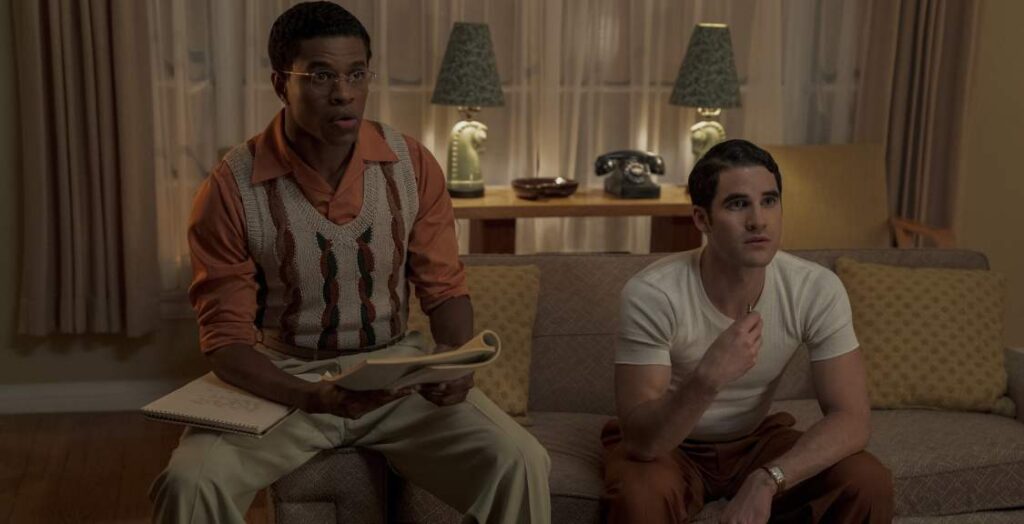
Famous women of color in old Hollywood, like Hattie Mcdaniel and Anna May Wong, are trotted out like pieces of trivia. Instead of showing actual deference to the characters or using their presence as a way of pushing the narrative, they are quickly shown and discarded. Any useful commentary or speaking on the experience of performers of color seems to play second-fiddle to the stories of white or white-passing characters. Suffice to say, that a story about uplifting minority artists spends a lot more screen time on the journeys of white people.
Hollywood (2020) talks a big game about seeking to give voice to the voiceless retroactively. It uplifts film and entertainment onto this great pedestal as the bringer of change. The series evangelizes the importance of stories being boldly and truthfully told and, yet, gives a redemption arc to its sexual predator and walking #MeToo allegory. Let’s call this honestly and as we see it. Henry Willson, a notorious real-life Hollywood asshole and widely understood to be a predator, is portrayed as such in the show. He’s a sexual abuser and manipulator, and in the final episode of the show, the fictionalized Rock Hudson admits he still has nightmares of his abuses.
I sat through the series, watching this walking illustration of the abuse that runs rampant in Hollywood. One of the many boogeymen of the industry that swallows up people and spits them out. It seemed almost certain that the perfect ending, the ultimate righting of past wrongs, would be to grant Rock Hudson release from his trauma and symbolically take down that history by taking down Henry Willson. Instead, they gave Henry redemption and the reward of producing a progressive and bold film. In a single instant, Hollywood lost every ounce of its integrity and credibility.
It’s difficult to rate Hollywood (2020). The show is addicting and beautifully rendered. The performances are excellent and it’s a hell of a good time. It should be great, but it can’t live up to its own lofty promises. Just like the problematic historic films that it seeks to critique, in order to enjoy Hollywood you have to hold your nose and swallow its shortcomings.
Hollywood (2020) is streaming now, exclusively on Netflix.
Hollywood
-
Rating - 6/106/10
TL;DR
It’s difficult to rate Hollywood. The show is addicting and beautifully rendered. The performances are excellent and it’s a hell of a good time. It should be great, but it can’t live up to its own lofty promises. Just like the problematic historic films that it seeks to critique, in order to enjoy Hollywood you have to hold your nose and swallow its shortcomings.

